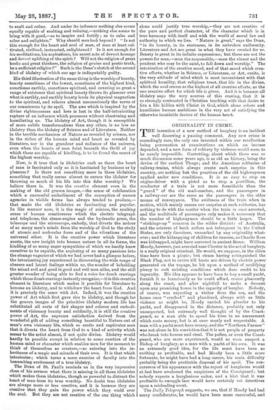ORIGINALITY IN CRIME.
THE invention of a new method of burglary is an incident well deserving a passing comment. Any new crime is exceedingly rare, the only one invented within our recollection being personation at examinations on which an income depended, and a new form of robbery by violence would seem to be nearly impossible. Garrotting, about which there was so mach discussion some years ago, is as old as history, being the device of the earliest Thugs ; and the American robberies of railway-trains, which always create such surprise in this country, are nothing but the practices of the old highwaymen applied under new conditions. It is as easy to stop an engine-driver with a pistol as to stop a postillion, the conductor of a train is not more formidable than the "guard" of the old mail-coaches, and the passengers in a railway-car are the same as the passengers in the older means of conveyance. The swiftness of the train when in motion, which mainly causes our surprise at such robberies, has nothing to do with the matter when the train is once arrested, and the multitude of passengers only makes it necessary that the number of highwaymen should be a little larger. The " stickings-up " common in the wilder districts of Australia, and the seizures of bank coffers not infrequent in the United States, are only dacoitees, unmarked by any originality what- ever ; and the kidnapping of children for ransom, as Charlie Ross was kidnapped, might have occurred in ancient Rome. William Moody, however, just arrested near Chester in the act of burglary, is a really original criminal. He would, we suppose, in the olden time have been a pirate; but steam having extinguished the Black Flag, not to revive till boats are driven by electric power generated on the voyage, he hit upon a method of modifying piracy to snit existing conditions which does credit to his ingenuity. His idea appears to have been to bey a small yacht, furnish it as luxuriously as he could afford, cruise pleasantly along the coast, and after nightfall to make a descent upon any promising house in the capacity of burglar. Nobody, of course, was expecting a visitor from the sea, and the house once " cracked " and plundered, always with as little violence as might be, Moody carried his plunder to his yacht, and disappeared in the distance, probably not only unsuspected, but extremely well thought of by the Coast- guard, as a man able to spend his time in an amusement which costs money, but is at once manly and respectable. A man with a yacht must have money, and the " Northern Farmer" was not alone in his conviction that it is not people of property who break into houses and steal. The police, or even the Coast- guard, who are more experienced, would as soon suspect a Bishop of burglary, as a man with a yacht of his own. It was an extremely good idea, for the life must have been as exciting as profitable, and had Moody been a little more fortunate, he might have had a long career, his main difficulty probably being the profitable disposal of his spoil. The con- currence of his appearance with the report of burglaries would at last have awakened the suspicions of the Coastguard ; but nobody expects a burglarious sailor, and a hint that it was profitable to smuggle lace would have certainly set detectives upon a misleading scent.
The Daily Telegraph suggests, we see, that if Moody bad had many confederates, he would have been more successful, and
might even have carried on a career of plunder upon foreign coasts ; but, we take it, the use of numbers would have speedily betrayed him. He would either have become a regular pirate, robbing houses by force, in which case he would have been over- hauled to a certainty by some swift revenue steamer, or the captain of a gang of burglars, liable to the treachery of any one under his command. The kind of man capable of striking out an original course of crime seems in our day to dislike confederates ; at least, that is the moat credible explanation of the infrequency of gang robberies in Europe. He might not mind if he were captain, as he was in all the old legends of crime, and could take the best share for himself, and live in personal luxury, and still enforce discipline ; but that has become nearly impossible. The spirit of the modern world has infected criminals like everybody else; they are all Socialists in theory; and we never hear now of a leader who gets a share in the plunder much greater than that of his comrades. There is an impatience of discipline, too, among robbers as among schoolboys, and alto- gether robber bands seem, except in the worst districts of Spain, a little out of date. The salt smugglers of the Spanish frontier who have to fight the guardia civile, possess a semi-military discipline, and so do Sicilian brigands ; but your intelligent robber in France, or England, or Germany, rather dreads many tongues. Indeed, we fancy that if he is competent to think out original designs, he prefers fraud to violence, as being safer, and in the long-run much more profitable. When the receiver's profits are deducted, and the cost of buying information, the profits of housebreaking are not great—the receivers, it is said, only give £1 for a watch, whatever it may be worth, and their allowance for silver is disreputable, even for times when the metal is quoted at 43d. an ounce—and we can scarcely recall an instance, except that of Peace, in which a criminal who em- ployed violence lived habitually in comfort. Novelists tell us of each persons ; but they never turn up in the police-courts, though Magistrates are aware of receivers who are rich, and of men who live in luxury by chantey. The object of modern crime is to get money in comparatively large sums; and, with the exception of the able scoundrels who make a specialty of stealing jewels from the very rich, criminals of ability nowadays prefer fraud. No burglary will yield the reward of a successful forgery ; and a coiner, while he is undetected, has twice the comfort of any highwayman. We doubt if the pirates in their best days ever made half the money that has fallen to successful manufacturers of bank-notes, and a " confederacy of crime" in our day is usually organised either to draw mock bills on its members, or to circulate in many places at once imitated bills of exchange. The most intel- lectual criminal of modern days—the French noble who tried to rob twenty banks at once, and was crushed by the Times—hoped to have made nearly a million sterling, and solicitors in the City have heard curious stories of manu- factured foreign bonds and railway bonds which the Govern. ments and Companies assailed would not denounce lest the credit of their loans should suffer. Able criminals, in fact, have grown both greedy and timid, and leave violent crime for the most part to men without the intelligence to devise frauds, or to know the safest methods of securing illicit gain. Even in their own line, too, they grow a little hampered. They like to be comfortable when they have won, and the feeling that detectives are after you, and that the end may be penal servitude, is not conducive to comfort. There was a little spice of desire for adventure in the old highwayman, brutal villain as he usually was; but the present age is prosaic, and we fancy the desire is slowly dying away. Peace had some of it, and so must William Moody have ; but, as a rule, in stories of crime as they come out in police-courts, we note an increase in cunning and in adroitness in providing for escape, and miss the old dash and energy. Of increasing success there is certainly not a trace ; and the man in whom novelists delighted, who was at once a king among burglars and a country. gentleman, has vanished into space, with the wealthy merchant whose lower tier of cellars was filled with "priceless" smuggled goods. If there are highly successful criminals still, they are receivers or swindlers, or makers of bank-notes, and even they, we suspect, turn aside as soon as they can, to try rogueries less distinctly outside the law. It is not felony to buy up stocks for which the sellers have never paid, and it is exceedingly profitable; as it is also to borrow on claims which exist only in the claimant's invention. Pecuniary morality does not improve, or we should not have so many "promoters" who, in all but legal liability, are ordinary thieves ;
but the reluctance to face the law does, and we imagine the success of positive crime tends slightly to decrease. At least, we rarely notice, except in the case of contested wills, a really great haul made by direct criminality, and in those the guilty parties seldom belong to the regular criminal class. They are men or women who have been tempted by a sudden chance of great gain, not confirmed criminals like the men whose systematic murders forced the Legislature to alter the law about insurances on lives. We are accustomed to think our age the worst ; but if the old will reflect, they will see a vast improvement in at least one department of crime,—that of habitual murder for gain. Palmer would in our day start a company or advertise a pill, and feel his chance of being hanged to be a distinct drawback on the success of his efforts to obtain comfort at others' expense. There are the dynamiters, it is true; but outside Russia they dislike death, and, in theory at all events, they seek for vengeance, and not for gain.



































 Previous page
Previous page